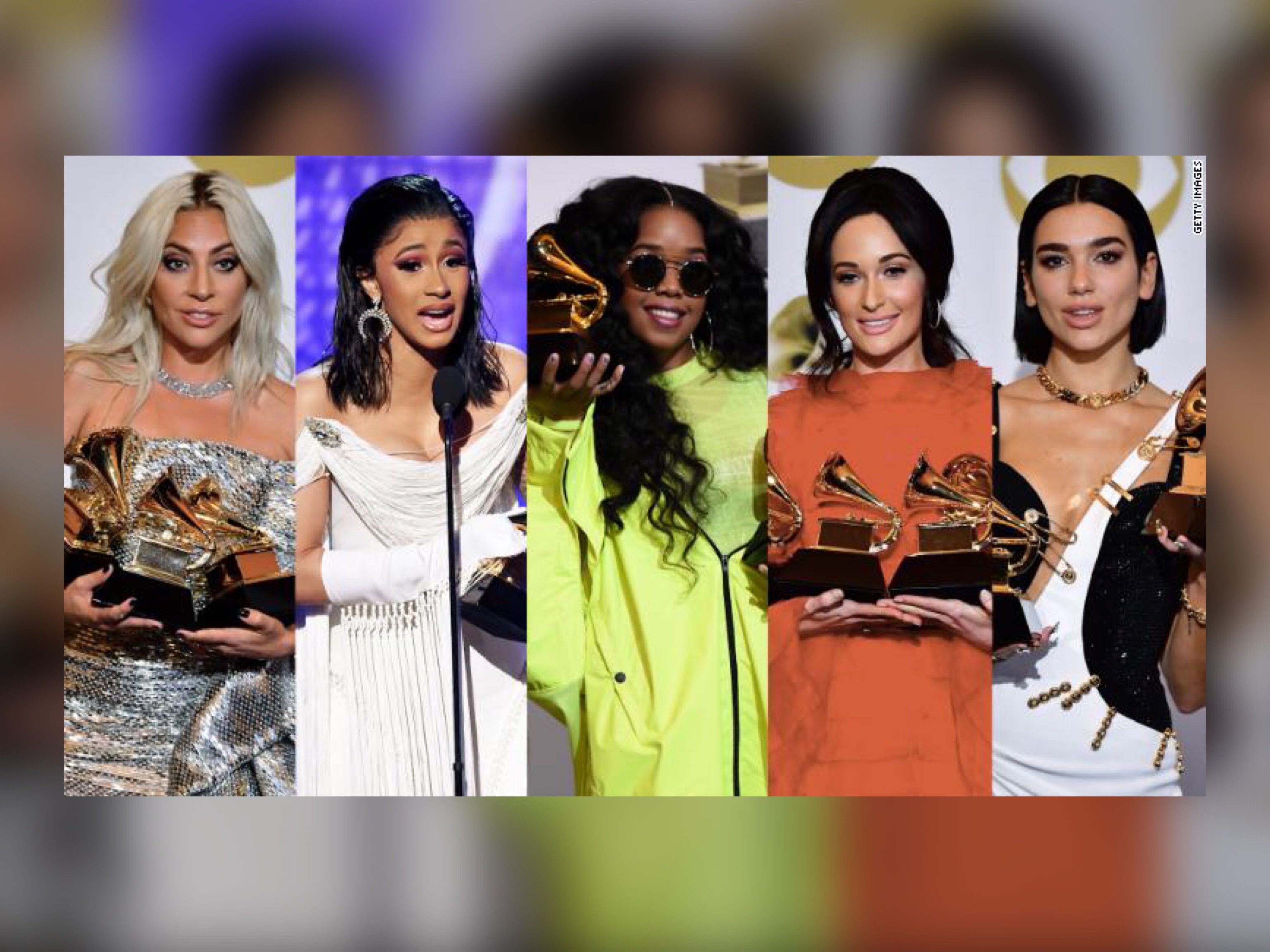(February 11, 2019) Last year, Grammy President Neil Portnow stepped in it when he addressed the media with a tone-deaf explanation for why he believed women were glaringly under represented at the 2018 Grammys.

In an interview with Variety when asked about the male/female imbalance that year, he suggested women needed to “step up” in order to get better recognition, words he later walked back and said were taken out of context. It sparked many to call for Portnow’s resignation, calls that grew even louder after allegations of Grammy funds misuse surfaced within weeks of the “step-up” mess-up.
Fast-forward to 2019 and this year’s ceremony, which comes months after Portnow indeed announced that this Grammys would be his last as he would be stepping down when his contract expires in July.
Boy, what a difference a year makes!
After the 2018 show in New York where only one female was awarded a trophy during the televised portion, this year’s Grammys in L.A. did a complete about-face… a 180-degree seismic shift that, on its surface, would appear to have wiped out all of NARAS’ previous insensitivities to women in one night.
Consider these winners (all women):
Album of the year: Kacey Musgraves (Golden Hour)
Best R&B Album: H.E.R. (H.E.R.)
Best Rap Album: Cardi B (Invasion Of Privacy)
Best Pop Vocal Album: Ariana Grande (Sweetener)
Best Country Album: Kacey Musgraves (Golden Hour)
Best Latin Pop Album: Claudia Brant (Sincera)
Best Gospel Album: Tori Kelly (Hiding Place)
Best Jazz Vocal Album: Cecile McLorin Savant (The Window)
Best Americana Album: Brandi Carlile (By The Way, I Forgive You)
Best New Artist: Dua Lipa
So that’s nearly every major album category (and some non-major) plus the coveted new artist trophy.

Notable winners that were not women?
Best Dance/Electronic Album: Justice (Women Worldwide)
Best Rock Album: Greta Van Fleet (From the Fires)
And that’s likely because Grammy voters probably thought those were women given the titles and artist’s names.
Oh, and fourteen of this year’s 18 televised performances – nearly 80% – were by women, not to mention this year’s host being singer and 15-time Grammy winner Alicia Keys, who became the first woman to host the show in 14 years (since Queen Latifah did it in 2005). Notably, the Grammys went without a host for a number of years before rapper LL Cool J and then late-night TV host James Corden took the reigns the past seven ceremonies.
Also this year, with tributes to Dolly Parton, Diana Ross and the late Aretha Franklin – the queens of country, Motown and soul, respectively – a special guest appearance (and speech) by former First Lady Michelle Obama, plus two non-female specific tributes that were done by women (a Motown tribute was helmed by Jennifer Lopez, and a Donny Hathaway nod was given by sisters Chloe & Halle), the 2019 Grammys definitely swung the pendulum toward the ladies.

So much so, in fact, that it seemed a bit contrived, or at least like a smack in the face to those who would like to think that the awards still hold some ounce of credibility in an otherwise politically and popularity driven contest.
I mean think about it. The Grammys can’t really expect us to buy into the notion that women all of a sudden “stepped up” their game to this magnitude while their flailing male counterparts could do no better than some noteworthy wins for singles here and there (Childish Gambino’s “This Is America” took home wins for both Record and Song of the Year; other males took song and vocal performance trophies).
That this year’s ladies domination came in the wake of Portnow’s famous blunder – not to mention the speech he gave at this year’s ceremony, where he appeared to halfway acknowledge his prior insensitivity – gave it an air of inauthenticity, sort of like a game referee giving a team a make-up call after screwing it over with bad calls all night long.
Except this was that on steroids.
The truth is, women never really should have had to “step up” their game to be given due recognition. And some would argue that this year’s crop of winners didn’t have any more game than last year’s notable snubs (or even this year’s: artists like Taylor Swift and Ariana Grande were left out of major categories for their chart-topping albums).
And now Portnow, the man responsible for how the Grammys are presented to us each year, is stepping down. We likely saw the last of him on Sunday night with his seemingly sincere speech about recognizing diversity in music – the latest of many heavy topics he’s tackled annually during his 17 years at the helm.
Indeed, the truth about The Grammys newfound “woke” status lies in whether next year’s ceremonies, with a new chief and what will likely be the same bloc of voters, will sustain the gains women made this year… or even come close.
Or will it be a return to the Grammys of old, where men who don’t have to step up their games win out, and women get to sit back and watch?
Or even better, maybe the Grammys will achieve some kind of balance, and avoid these wild pendulum swings altogether.
DJRob



